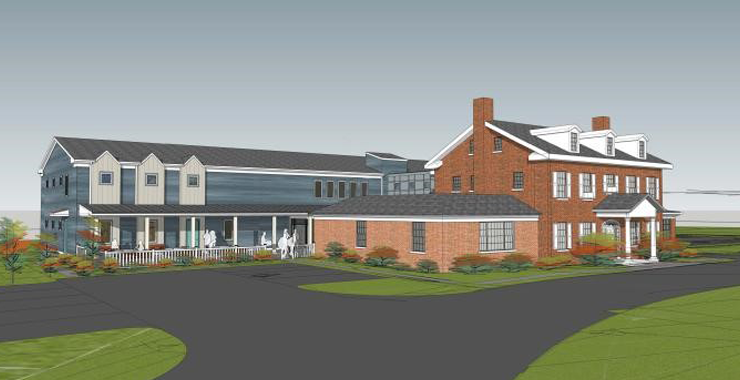BY: NATE RIDDLE
Executive Director of Open Doors, a non-profit based in Harrisonburg, Virginia, with a mission of providing shelter, compassionate support, and access to services.
MISSION AND VISION
Fueled by a compassionate community, and a people-centered City administration, Harrisonburg has embarked on a mission to open the Homeless Services Center. A dynamic public-private partnership, the Homeless Services Center will be a place of transition for our community’s unhoused, and a center for critical health and human services for the entire community we serve.
HISTORY OF SERVICE
 Since 2007, Open Doors has provided shelter, compassionate support, and access to services for those experiencing homelessness in the Harrisonburg – Rockingham community.
Since 2007, Open Doors has provided shelter, compassionate support, and access to services for those experiencing homelessness in the Harrisonburg – Rockingham community.
This mission was achieved through a rotating thermal shelter, which operated the coldest months of the year out of facilities that changed every week to two weeks. This model was employed for all but during the pandemic, where we operated a continuous shelter to respond to the public health crisis. One we were all facing but the unhoused was especially being impacted by.
EXPANDING VISION
While a year-round shelter has always been a goal of Open Doors and the community, the pandemic engaged new partners and the City at a greater level. This time, while unfortunate and traumatic for many, reaffirmed the need for the vital service a year-round facility would be. Understanding this at a greater level, the City purchased 1111 North Main Street from the Shenandoah Presbytery to establish a low-barrier shelter, and daytime drop-in center with the goal of expanding critical services to the community and making homelessness rare, brief, and nonrecurring.
Immediately, the City continued to engage community partners to build a vision and plan for the 3.68 acres and the existing structure located conveniently for this purpose.

1111 North Main Street, Harrisonburg, VA 22802
OPERATIONAL DETAILS
From day one, Open Doors has been all in, and has been committed to partnering with the City and community to make this project come alive. We collaborated with the community prior to the request for proposals (RFP) and official procurement process. We diligently submitted a comprehensive proposal that prioritized a holistic person-centered approach, and collaboration.
SERVICES AND FACILITY DETAILS
In February of 2024, the city selected Open Doors to operate the facility, and we intend to bring more than five community organizations onsite on a routine basis to provide healthcare, mental health, housing counseling and ALICE-oriented services.
 The facility will have the following services:
The facility will have the following services:
- DAILY ‘CENSUS OF 72’
- SMALL CLINIC
- ADMINISTRATIVE WING FOR SERVICE DELIVERY
- KITCHEN FOR MEAL SERVICE
In addition to these services, it will also have room for a lot of potential offerings down the road. I am encouraged by this project, and our community’s continued innovative compassionate response to this complex issue challenging us all.
PROJECT TIMELINE
The project is expected to be completed in October of 2024, with public services beginning by the end of 2024. It will serve not only as a safe and inclusive place for shelter, but a first point of entry and a beacon of hope for all that need services in the Harrisonburg – Rockingham community. I look forward to this project inspiring others to pursue similar initiatives, to bring life-changing services to their community, and embracing the often unseen and underserved.
For more information, visit the City of Harrisonburg’s project page or Open Doors’.
- Improved Manufactured Home Lot Rental Act (MHLRA) (Del. Delaney, Sen. Hashmi)
- HB 572 / SB 232 increases protections for manufactured home park residents and removes confusion from the MHLRA by limiting the amount of late fees park owners can charge for unpaid rent, granting a right of redemption for tenants facing eviction for unpaid rent, prohibiting the automatic renewal of a lease if the tenant gives proper notice of termination, and clarifying the allowable reasons for eviction.
- Increased Relocation Funds for Manufactured Home Park Residents (Del. Krizek)
- HB 1397 requires a manufactured home park owner to provide each resident with $5,000 to cover relocation expenses if their rental agreement is terminated due to the sale of the park to a buyer planning to redevelop or change its use.
- Automatic Eviction Record Expungement (Del. Hope)
- HB 73 requires courts to automatically expunge eviction records for dismissed cases after 30 days and for nonsuited cases after 6 months.
- Early Lease Termination for Survivors of Domestic Violence (Del. Delaney)
- HB 764 gives victims of domestic violence or sexual abuse the right to terminate a rental agreement early if they have a permanent protective order and give proper written notice of termination.
- Increased Maximum Building Code Violation Fines (Del. McQuinn, Sen. Bagby)
- HB 578 / SB 538 increases the maximum fine localities can impose for repeated violations of the Uniform Statewide Building Code, defined as three or more offenses of the same nature within a ten-year period.
- Single Exits for Residential Buildings Workgroup (Del. McClure, Sen. VanValkenburg)
- HB 368 / SB 195 creates an advisory group to evaluate and suggest changes to the Uniform Statewide Building Code that would permit the use of single exit stairways in multifamily residential buildings under six stories and thus allow more dense and diverse housing in Virginia.
- Increased Community of Opportunity Program (COP) Tax Credits (Del. Willett)
- HB 1203 increases the amount of tax credits available for landlords renting to Housing Choice Voucher holders in high opportunity areas and earmarks a portion specifically for use in rural regions.
- Community Revitalization Funds (Del. Coyner, Sen. Locke)
- HB 478 / SB 49 enable all localities to establish Community Revitalization Funds, which can be used to prevent neighborhood deterioration through residential and infrastructure development

